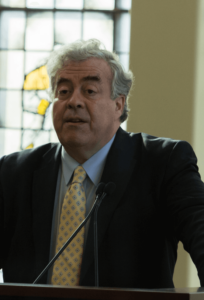by The Cowl Editor on April 4, 2019
News

By Malena Aylwin ’22
News Staff
Last Thursday, March 28, Providence College invited Dr. Stephen M. Barr to host a seminar on the mythical conflict between science and religion. Since the Middle Ages, it has been thought that science and religion do not mix and are put at odds with each other, but why?
Born into a Catholic family, Dr. Barr was always influenced by this. When he decided he wanted to be a STEM major, he wondered why so many people thought that religion was against science.
“Popular belief tells us that science and religion don’t go together, one is rational and the other is irrational [myth],” said Dr. Barr.
Being a scientist, Dr. Barr raises this question in his life because of his knowledge and practice of Catholicism. “Many people wonder why I say that religion and science can go together; in the end, they both want to answer similar things. Science tells us the things we can measure, and religion [faith] answers deeper questions like the purpose of human life or where do we go when we die?” stated Barr.
Contrary to popular belief, science and religion both provide a sense of wonder; and the idea that everything in the natural world is held together in a coherent manner. The majority of people that think religion and science do not share the same ideals or they are not supposed to be on the “same page” are people that do not look at the bigger picture, which shows that there is a midpoint in which the perspectives meet and actually have the same goal of answering questions.
Dr. Barr described the relationship between science and religion, and how these two studies impacted history, as well as modernity.
One aspect of his lecture that pertains to DWC is the idea that there are no scientific facts that contradict Catholic doctrine. As we discuss the Bible and various religious figures, we discuss the existence of God and how it cannot be proved or disproved through science.
Martin Luther describes how one must have faith in the existence of God in order to form a lasting, genuine, and intimate relationship with God and Catholicism.
Another point Barr made is that God is the cause of nature and that nature is the evidence of the existence of God. This idea also pertains to DWC because of our discussion of the creation story. If God created everything, then everything is evidence of God’s existence.
The most interesting point that Barr made in his discussion was the difference between science and science materialism. Materialism is the idea that all reality is reducible to matter. But if this idea is true, human beings have no soul because they are no more than a grouping of atoms. Thus, God would also not exist because he is not a part of the physical world. This idea seemed extremely important due to the conflict between the idea of scientific materialism and its relation to Epicureanism.
Overall, Barr’s lecture was an interesting talk comparing the ideas of both religion and science. Barr’s knowledge of this topic is essential because if humanity learns how to accept different types of perspective, it will relieve the problem of science versus religion.